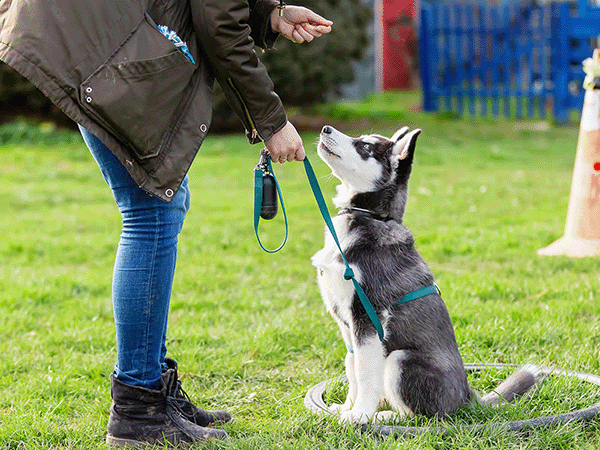Chihuahua: Breed Facts, Experience and Tips from 9K+ Owners

Discover the Chihuahua, a toy breed celebrated for its loyal, alert, and intelligent nature. Considered a small dog, Chihuahuas were originally bred in Mexico for companionship beginning in the 1850s.
In this post, we share insights from almost 10,000 Sniffspot users, offering practical advice for new and prospective Chihuahua owners. Whether you’re considering owning or rescuing a Chihuahua yourself or already have one, you'll find valuable tips on how to care for and enjoy life with a loyal Chihuahua.
As Sniffspot user Abi says, "I love that they are loyal and fierce and just so loving to their owners. I also like that he’s protective of me."

Source: Sniffspot Community Breed Survey 2024
Chihuahua Quick Characteristics
- Breed Type: Companion
- Size: Small
- Life Expectancy: 12 - 20 years
- Healthy Weight Range: 2 to 6 lbs
- Height Range: 6 - 9 in
- Temperament: Loyal, Alert, Intelligent
- Coat Type: Short or long
- Color: Various, including fawn, black, white, brown, and combinations
About the Chihuahua
According to almost 10,000 Sniffspot community users who shared real-world data about their Chihuahua, we learned these dogs are loyal and alert. The Chihuahua is cautious around children and very friendly with other pets.
When living with a toy breed like a Chi, 56% of our owners said a large house with a fenced yard is ideal for these small pups. Additionally, 41% of owners said an apartment or condominium with regular walks is also acceptable. This dog is somewhat trainable, usually needing professional guidance and owners say the Chihuahua learns best with positive reinforcement, consistent routines, and socialization.
When it comes to exercise, 38% of Sniffspot owners say their Chihuahua benefits from low exercise every day, including around 30 minutes of walks and playtime a day. The Sniffspot Chi community would recommend this dog for first-time owners. Considered a relatively robust dog, Chi's don't face too many health problems compared to other toy breeds. This makes them a good fit for first-time owners and ideal additions to family households.
History and Origin of Chihuahua
Chihuahuas, often misunderstood, are more than just tiny lap dogs. Contrary to the stereotype of being frail or overly "yappy," Chihuahuas are stable, friendly, and surprisingly active breed, fitting into family life and even taking on agility challenges. Their origins are debated, with theories suggesting they hail from Mexico, were brought by Spanish traders from Malta, or might even have roots in China. Early writings even made wild claims about them being related to chipmunks!
Historically, Chihuahuas were affectionate family dogs cherished by the Toltecs and Aztecs in Mexico, where they were not only pets but also played a role in spiritual rituals. The breed was eventually recognized in the U.S. in the early 1900s, with notable figures like James Watson and Owen Wister contributing to its popularity as proud additions to family households.
By 1923, the Chihuahua Club of America was founded, and the breed gained further recognition with annual specialty shows. Over time, Chihuahuas have earned a place in both show rings and homes across the country, with celebrities like Billie Holiday adding to their charm.
Chihuahua Traits and Characteristics
- Temperament: Loyal, Alert, Intelligent
- Energy Level: Low
- Trainability: Somewhat trainable - Learns commands, but requires extra patience and repetition.
- Grooming needs: Low maintenance - Requires minimal grooming, such as occasional brushing and baths.
- Good with Kids: Cautious around children
- Good with Other Pets: Very friendly with other pets
What to Expect as a Chihuahua Dog Owner
As a Chihuahua owner, it's important to know the best dog breed tips as well as expectations from current Chihuahua owners. Affectionate family dogs, these toy breeds benefit from enrichment activities and regular activity levels.

Source: Sniffspot Community Breed Research 2024
Grooming Needs
Chihuahua dogs require low-maintenance grooming. This means Chihuahua owners should expect minimal grooming, like occasional brushing and baths. Chihuahua dogs have either a short or long coat depending on the specific type, bred for its appearance. Both their short and long coats are considered low shed.
To keep your Chihuahua's coat healthy and up to breed standards, brush weekly (or more frequently for long-haired). Of the coat types for pups in the companion group, the coat grooming needs for Chihuahua are low maintenance.
Exercise Needs
Chihuahuas require low activity each day. Though one of the most popular dog breeds, Chis are considered a very athletic, high-energy breed. Chis make great pets, and they thrive with around 30 minutes of walks and playtime a day. Owners of Chis report their dogs especially love playing with squeaky toys, tug-of-war, and chasing/playing with a ball or frisbee.
When small breeds like Chis don't get sufficient exercise, they're more likely to act out on undesirable behaviors like becoming prone to excessive barking and fearfulness. They need consistent training, mental activity, and regular low exercise to avoid excess energy.
Diet and Nutrition
What should you feed your Chihuahua to keep him healthy? As a low-energy breed, what you feed them is important. A reported 49% of our community feed their Chi commercial dry kibble, with the remainder opting for a specialty or homemade diet.
With low exercise, Chis should eat 0.5 to 1 cup of vet-recommended food to maintain a healthy weight of around 2 to 6 lbs. However, your Chihuahua's ideal weight and food depend on your pet's sex, activity level, and age.
Breed Health Concerns
The Chihuahua breed is most prone to dental problems and dental disease (e.g., periodontal disease, tooth decay) and skin conditions (e.g., allergies, dermatitis). A reported 49% of our Chihuahua owners reported dental problems like periodontal disease, dental calculous, tooth loss, bad breath, or an oral infection. Chi's risk for these challenges increase as they age.
Similarly, 24% reported skin conditions like allergies, yeast infections, impetigo, ringworm, alopecia, and folliculitis. Lastly, 23% of Chihuahua owners claim their dog struggles with joint problems like arthritis, elbow dysplasia, degenerative issues, and osteosarcoma — a common Chi health concern. If you're worried about any of these health issues above, talk to your Chi's vet.
How Friendly Are Chihuahuas?
Another important thing to consider when adopting a Chi is whether or not they fit with your current family. How friendly are Chihuahuas compared to other small-sized breeds?

Source: Sniffspot Community Breed Survey 2024
With ongoing training, you can hone your Chi's alert instincts into a loving and friendly family dog. Introducing your pet to positive reinforcement (treats, praise, rewards) and consistent daily training routines early helps them avoid undesirable behaviors like becoming prone to excessive barking and fearfulness. Our community Chihuahua owners comment on their pet's friendliness:
- Big personality in a tiny body, very loyal, low maintenance. (Nina)
- Not for families with small children -- they are very fragile. Mine is 6 pounds. (Rhonda)
- Socialization with other dogs and people so that they don’t get territorial, protective, or fearfully aggressive. Also potty training (lol). (Valerie)
How to Train a Chihuahua
Whether you're adopting a Chi puppy or a grown Chihuahua adult, training is a large part of owning a small breed. When you fail to train your Chi properly, they're more likely to display undesirable behaviors like becoming prone to excessive barking and fearfulness, and so on. Providing stimulating activities is a great first step, but this needs to be paired with the right training for your Chi.
As a companion breed, Chihuahuas benefit from praise and positive reinforcement. Here's what our Chi community recommended based on their experience with their own dog:
- Positive Reinforcement (90%): This includes treats, praise, rewards, and so on for positive behavior
- Consistent Routines (37%): A consistent training routine allows your pet to get comfortable with expectations
- Socialization (26%): Socializing your dog with other pets, dogs, and people prepares them to interact with the world
As dogs bred for companionship, Chis are considered somewhat trainable, usually needing professional guidance.
What Do Owners Love About Chihuahuas?
We asked Sniffspot Chi owners what they love the most about their Chihuahua pups, and here's what they had to say:
- I’ve become a chi fanatic after a decade in LA fostering and rescuing. They’re so loyal, affectionate, cuddly and smart. Great companions for city living! (Valerie)
- No shedding, easy to maintain, really inexpensive to feed due to small size, loving. (Shey)
- They are tiny but have huge personalities! And they live a long time. Mine is 16 and still in excellent health! (Laura)
What Are the Biggest Challenges for Chihuahua Owners?
Similarly, Chi owners shared some of the biggest challenges of living with Chihuahua:
- They are often misunderstood as being mean dogs because people do not understand how to treat them. They need to be treated like any other dog and not treated like an accessory or a toy. They need to be given boundaries to understand that aggression towards others is not okay, but also need to have others respect THEIR boundaries and not touch or handle them in ways that they aren’t okay with just because they are small and “can’t really hurt you.". (Miranda)
- They can be stubborn, and bossy when meeting new dogs. They are apprehensive towards strangers. (Melissa )
- People perceive chihuahuas as ankle-biters, and my dog happens to bark when saying hi. So it’s hard for people not to be scared of her, even when she’s wagging her tail while barking. It makes training difficult. (Claire)
Is a Chihuahua Right for a First-Time Dog Owner?

Source: Sniffspot 2024 Community Dog Breed Survey
According to 78% of our Sniffspot community, Chihuahuas are a great first-time dog. This comes from their loyal nature and low exercise needs. Chihuahua owners say it best:
- They are SO loving. Always wagging their tail when you kiss or hug them, and always willing to snuggle! (Claire)
- So loyal and sweet! Will love you so hard if you treat them well. So much personality (Victoria )
- They've got big personalities and make amazing companions when trained with patience and intention. (AK)
Advice for Chihuahua Owners
Luckily, our Sniffspot community is full of experienced, trustworthy Chi owners. These Chihuahua breed owners share the most essential dog breed tips and advice for prospective or new dog owners:
Treat them like a big dog.
- Train small dogs as you would a big dog, little dogs need training too! Good manners are important even when they are small. A small dog is still a dog, teach them. (Claire)
- Respect their space and body language. (Nina)
- Even though Chis are small, give them plenty of physical activity and enrichment activities like you would any large dog. Physical activity early on is so good for their joint health! (Mina)
Respect their space and body language.
- Respect their body language! Many smaller dogs get disrespected because they're small and cute but their feelings matter. (Victoria )
- If you have children make sure that they can respect the dog's personal space or the dog could become very aggressive due to it not feeling safe in the home. (Angel Galarza)
Socialize early and often.
- Training and socialization from the start, chihuahuas are not traditionally good with other animals, kids, or strangers so the earlier you introduce them the better. (LL)
- Socialize as a puppy and start commands as a puppy. (JB)
Give your pup regular playtime.
- Just because they’re small doesn’t mean they don’t need exercise or playtime. (Shelbey)
- Very loving, small but needs lots of activities and exercise. (Jessica)
Take care of their teeth.
- Chis are so prone to dental disease. Proper care must include brushing their teeth at least once a week -- more if you can! (M)
- My dog has struggled with dental disease even though I take so much time to clean her teeth. Be vigilant with their teeth early on and ask your vet about proper care for their little teeth. (Dee)
Frequently Asked Questions about the Chihuahua
What is the average lifespan of a Chihuahua?
The average lifespan of a Chihuahua is typically between 12 - 20 years years.
What is the size of a Chihuahua?
An adult Chihuahua weighs between 2 to 6 lbs pounds and stands between 6 - 9 in tall.
How much grooming does a Chihuahua need?
Chihuahua dogs require low-maintenance grooming. Regular grooming helps to keep their coat healthy and manageable. Chihuahua dogs have a short or long coat, which has been bred for its appearance and style. They are considered low shedders. Long-haired Chihuahuas require more grooming to keep their coats clean. Groomers recommend brushing your long-haired chihuahuas coat daily.
To maintain your Chihuahua's coat, it's important to brush them regularly, even more so for the long-haired version. Among companion breeds, Chihuahua grooming is categorized as relatively easy.
How much exercise does a Chihuahua need?
Chihuahuas require low activity each day. Though one of the most popular dog breeds, Chis are classified as a minimally athletic, low-energy breed.
Chis are excellent companions. Unlike high-energy breeds, they flourish with around 30 minutes of walks and playtime a day. Owners of Chis note that their dogs particularly enjoy playing with squeaky toys, tug-of-war, and chasing/playing with a ball or frisbee.
If small breeds like Chis don't receive enough exercise as part of their proper care, they may develop unwanted behaviors. These dogs need ongoing training, mental stimulation, and consistent exercise to channel their energy effectively.
How friendly are Chihuahuas with children?
According to our data, Chihuahuas are cautious around children.
How well do Chihuahuas get along with other pets?
Our research indicates that Chihuahuas are very friendly with other pets with other pets.
What should you feed your Chihuahua to keep him healthy?
As a low-energy breed, the diet of your Chi is crucial. A significant 49% of our community feeds their Chi commercial dry food like kibble.
For optimal health, Chis should consume 0.5 to 1 cup of vet-recommended dry food to maintain a healthy weight of around 2 to 6 lbs pounds. The exact amount and type of dry food will depend on your Chihuahua's sex, activity level, and age.
What health concerns are common for Chihuahuas?
The Chihuahua breed is particularly prone to dental problems like periodontal disease, dental calculous, tooth loss, bad breath, or an oral infection and skin conditions like allergies, yeast infections, impetigo, ringworm, alopecia, and folliculitis. Our data shows that 49% of Chihuahua owners reported dental problems like periodontal disease, dental calculous, tooth loss, bad breath, or an oral infection. Chi's risk for these health issues increases as they age.
Additionally, 24% reported skin conditions like allergies, yeast infections, impetigo, ringworm, alopecia, and folliculitis. Finally, 23% of Chihuahua owners indicated their dog struggles with joint problems like arthritis, elbow dysplasia, patellar luxation, degenerative issues, and osteosarcoma, which are common Chi health concerns.
It's important to keep up with your Chi's physical activity and enrichment activities to keep their joints healthy and strong. Aerobic exercise is also a great way to keep this active breed healthy as they age. If you have concerns about any of these health issues, consult your Chi's veterinarian.
Resources for Chihuahua Owners
Whether you're a current Chihuahua dog owner or you're considering adopting a Chi, Sniffspot is here to lend a helping hand. Here are some of the most relevant resources for Chihuahua owners.
- Best Chihuahua Dog Rescues & Shelters
- Most Popular Chihuahua Dog Names
- The Chihuahua Club of America
- ASPCA Facts About Chihuahuas
Sources:
Most recent articles
Related articles
Top dog guides per area
Dog training guides

Dog Food Aggression: Why You Shouldn't Punish It
Does your dog ever growl when you walk by their food dish? Maybe they get possessive of treats, carrying them far away and giving you side-eye when you start to approach — or snarling at your other pets or children if they get too close.

Best Dog Fields in the US: 25+ Wide-Open Spaces for Your Pup to Run Free
The best dog fields in the US offer something that traditional enclosed parks simply can't match: acres of open space where your pup can truly stretch their legs and run at full speed. From Colorado's 470-acre prairie meadows to Tennessee's award-winning "Outback," these wide-open spaces allow dogs to roam, explore, and exercise naturally while engaging instincts that cramped urban parks suppress.

The Ultimate Guide to Scent Training for Dogs
Your dog's nose is an amazing tool. Did you know they have 40 times the olfactory receptors than humans? Scent training for dogs taps into this superpower, turning everyday moments into exciting sniff-fests. It's enriching for all types of dogs – reactive, shy, or simply adventurous. Ready to explore the world of scent work for dogs? Let's get started.

Service Dog Training Costs: DIY vs. Pro
More than 80 million Americans rely on their service dogs to help them navigate the world. Task-trained assistance animals perform a huge range of life-changing—in many cases, life-saving—services: These dogs act as eyes for visually impaired handlers, provide mobility support, alert to seizures and blood sugar crashes, interrupt anxiety attacks, remind their people to take medications, and so much more.

How to Deal With Puppy Potty Training Regression
You thought those dreaded middle-of-the-night potty breaks were over. You were finally free from cleaning up puppy puddles. Then, suddenly, your furry friend starts having accidents again. It's frustrating, right? This puppy potty training regression is more common than you think. Don't worry; we'll help you get your pup back on track. We'll cover the common causes, offer practical solutions, and give you actionable steps to tackle this challenge together.

Dirty Dog Syndrome: Causes, Solutions, and Prevention
It's a cringe-worthy moment every dog owner dreads: your furry friend chowing down on something truly disgusting. If your dog has a penchant for poop, you're dealing with coprophagia. It's more common than you think, and thankfully, often manageable. This article explores the reasons behind dirty dog syndrome, from instinct to learned behavior. We'll also give you practical tips to help break this unpleasant habit.

How to Train Your Rescue Dog: A Complete Guide
* All Sniffspot articles are reviewed by certified trainers for quality, please see bottom of article for details *
Dog enrichment guides

Best Dog Water Parks in the US: 15+ Amazing Splash Destinations for Your Pup
Do you have a water-loving dog looking to burn some energy? There are countless dog parks to visit throughout our country — but some of them become far too hot in the midday sun to be safe for your pets to play. That’s why we’ve put together a list of some of the best dog water parks throughout the United States! At these locations, your pup can frolic, splash, and swim to their heart’s content.

Best Dog Fields in the US: 25+ Wide-Open Spaces for Your Pup to Run Free
The best dog fields in the US offer something that traditional enclosed parks simply can't match: acres of open space where your pup can truly stretch their legs and run at full speed. From Colorado's 470-acre prairie meadows to Tennessee's award-winning "Outback," these wide-open spaces allow dogs to roam, explore, and exercise naturally while engaging instincts that cramped urban parks suppress.

Best Toys for Herding Dogs: Keeping Your Pup Happy & Engaged
Herding dogs are amazing, intelligent companions. But that also means they need more than just a simple game of fetch. Finding the right toys for herding dogs is key to keeping them happy and stimulated. This article explores some of the best toys for herding dogs, including options specifically for breeds like Border Collies and Australian Shepherds. We'll help you discover the perfect herding toys for dogs to tap into their natural instincts and keep them entertained for hours.

Tough Dog Toys for Aggressive Chewers: A Practical Guide
Does your dog destroy every toy you give them? Is your house littered with the remnants of plush toys? Are you tired of wasting money on "indestructible" dog toys for aggressive chewers that don't last? Then this post is for you. We'll cover everything you need to know about finding the best dog toys for aggressive chewers, so you can finally give your pup something safe, durable, and fun.

Daily Exercise Calculator: How Much Exercise Does Your Dog Need?
Everyone knows dogs need exercise, but how much is enough? Walks are great, but creating a truly balanced fitness plan means understanding your dog's specific needs. This post helps you develop a daily exercise calculator for your dog, considering breed, age, and lifestyle. We'll cover fun activities, understanding exercise intensity, and recognizing when your pup has had enough. Let's create a plan that keeps your dog happy and healthy!

Complete Guide To Herding With Dogs
* All Sniffspot articles are reviewed by certified trainers for quality, please see bottom of article for details *

Dog Enrichment Activities: The Ultimate Guide
Ever feel like your dog is restless or bored? They may be getting enough exercise, but still need more. That's where enrichment activities for dogs come in. Giving your dog opportunities to sniff, explore, and problem-solve can make a world of difference. Whether you have a puppy, adult, or senior dog, enriching their environment is key for their well-being. Let's explore how to add cognitive enrichment for dogs, even tailoring activities to your dog's breed with breed specific enrichment and fun enrichment games for dogs.
Dog reactivity guides

Rottweiler Aggression: Truth vs. Myth
Many dogs have gotten a bad reputation over the years for being "dangerous breeds." Rottweilers are among them. Like pit bulls and other large, blocky-headed types of dogs, these powerful and beautiful animals are often assumed to be aggressive.

Best Dog Fields in the US: 25+ Wide-Open Spaces for Your Pup to Run Free
The best dog fields in the US offer something that traditional enclosed parks simply can't match: acres of open space where your pup can truly stretch their legs and run at full speed. From Colorado's 470-acre prairie meadows to Tennessee's award-winning "Outback," these wide-open spaces allow dogs to roam, explore, and exercise naturally while engaging instincts that cramped urban parks suppress.

What Is a Reactive Dog? A Practical Guide for Owners
Does your dog suddenly transform into a barking, lunging Tasmanian devil on walks? It's stressful for both of you. If this sounds familiar, you might have a reactive dog. Understanding what is a reactive dog is the first step to calmer walks. We'll explore the common triggers and give you actionable strategies to manage and modify this behavior. Let's turn those stressful walks into enjoyable outings.

How to Socialize a Reactive Dog: A Step-by-Step Guide
Does your dog display reactivity to other pets or people? Maybe they’re a new rescue pup and are still settling into your home. Or they were sick growing up, so you missed their critical socialization period. Possibly they’ve had a bad experience after being raised as a normal puppy.

What Is a Reactive Dog? A Complete Guide
Is your dog overly excited or fearful around other dogs? Do they bark, lunge, or whine? You might have a reactive dog. Many dog owners face this challenge. Understanding what a reactive dog is is the first step to helping them. This guide explores the common causes of dog reactivity, explains what makes a dog reactive, and offers practical tips and resources. Let's work together to build a stronger bond with your dog and enjoy stress-free walks.

9 Best Online Communities for Reactive Dog Parents
Does your dog's reactivity make walks stressful? You're not alone. Many dog owners face similar challenges. This guide offers practical advice and support for managing reactivity, including finding the best online dog training for reactive dogs. We'll connect you with reactive dog support groups, share training tips, and explore resources like the best dog training app for reactive dogs. Let's build a stronger bond with your dog, together.
* All Sniffspot articles are reviewed by certified trainers for quality, please see bottom of article for details *
How To Groom a Reactive Dog
* All Sniffspot articles are reviewed by certified trainers for quality, please see bottom of article for details *
Sniffspot community guides

The State of Public Dog Parks Across the United States
From 2009 to 2020, there was a 40 percent increase in the development of public dog parks. Designated spots for canine exercise have become commonplace in every major city in North America — many pet owners won’t even consider renting an apartment that doesn’t have its own fenced-in pet area for their canine companions.

Best Dog Fields in the US: 25+ Wide-Open Spaces for Your Pup to Run Free
The best dog fields in the US offer something that traditional enclosed parks simply can't match: acres of open space where your pup can truly stretch their legs and run at full speed. From Colorado's 470-acre prairie meadows to Tennessee's award-winning "Outback," these wide-open spaces allow dogs to roam, explore, and exercise naturally while engaging instincts that cramped urban parks suppress.

How This Family is Affording Their Dream Property Through Renting it Hourly to Dogs
Thousand Oaks, California has been a safe haven for Sniffspot host, Jen, since childhood. Having grown up in busy Santa Barbara, Jen, an introvert from an early age, would seek out solitude and serenity away from tourists attractions and droves of people visiting from elsewhere. “My grandparents own 60 acres about a 30 minute drive from here, and I grew up spending every summer and every holiday visiting them on the ranch,” Jen explained. “In Santa Barbara, we wouldn't go to the beach on the weekend because that's where everybody was, so you'd find places off the beaten path where the tourists weren't. For me, the ranch was just my happy place.”

Host Tips: Ellen K. What Makes Sniffspot Successful for Me
Ellen is the host of Country Pasture Getaway, one of Sniffspot's most popular sniff spots. She has taken the time to write up the lessons she has learned about how to be a great sniff spot host.

How this Oregon Farmer is Making a Business From Renting Her Land to Dogs
Just 20 minutes outside of the busy city of Portland, Oregon, and settled right on the banks of the Columbia River, you’ll find what countless visitors have flocked to the area in search of – mountain views, crisp, clean air, and running water for miles. What you might not expect to find, however, is a hidden oasis designed just for dogs and their people, owned and operated by a farming couple and enjoyed by visitors on two legs, and four.

Host Tips: Fran T. Providing Great Guest Service at our Spot
Fran is the host of Ranch Setting, one of Sniffspot's most popular spots. She has taken the time to write up the lessons she has learned about how to be a great Sniffspot host.

How Sniffspot Helped a Nervous Rescue Work Through His Fears and Change His Family’s Life
This is the story of a family and dog rescuing each other.
Top dog trainers in the US

The Best Dog Trainers in the United States of 2025
This is a list of the top dog trainers in the United States, based on votes from the Sniffspot community and the general public.
The Best Dog Trainers in Seattle, WA of 2025
This is a list of the top dog trainers in Seattle, WA, based on votes from the Sniffspot community and the general public.
The Best Dog Trainers in Portland, OR of 2025
This is a list of the top dog trainers in Portland, OR, based on votes from the Sniffspot community and the general public.
The Best Dog Trainers in Los Angeles, CA of 2025
This is a list of the top dog trainers in Los Angeles, CA, based on votes from the Sniffspot community and the general public.
The Best Dog Trainers in New York, NY of 2025
This is a list of the top dog trainers in New York, NY, based on votes from the Sniffspot community and the general public.
City dog parks guides

Top 10 Indoor Dog Parks: A US Guide
Looking for a space to play with your dog no matter what the weather’s like outside? Look no further than our list of the best indoor dog parks in the United States! These climate-controlled spaces are growing in popularity as pet ownership increases throughout the country. As a bonus, many of them also offer dog training, boarding, grooming, or daycare services on the premises.

Best Dog Fields in the US: 25+ Wide-Open Spaces for Your Pup to Run Free
The best dog fields in the US offer something that traditional enclosed parks simply can't match: acres of open space where your pup can truly stretch their legs and run at full speed. From Colorado's 470-acre prairie meadows to Tennessee's award-winning "Outback," these wide-open spaces allow dogs to roam, explore, and exercise naturally while engaging instincts that cramped urban parks suppress.

Best Dog Parks in the US: Ultimate Guide to Public & Private Off-Leash Adventures
Is your pup giving you those pleading "let me run free" eyes? Whether you're a new dog parent or a seasoned pro looking for fresh adventures, finding the perfect off-leash paradise for your furry friend can feel ruff! From sun-soaked California beaches where your water-loving lab can make a splash to mountain trails in Vermont where your adventure buddy can chase every scent, we've sniffed out the 15 best dog parks across America.

Dog Parks Near Me: Las Vegas Edition
Looking for the perfect dog park near me in Las Vegas? You're in luck! This guide explores all the best options for your pup, from public dog parks to private dog parks near me on Sniffspot. We'll help you find the ideal spot for playtime, socializing, and fresh air. Plus, we'll cover essential etiquette and safety tips to ensure a happy visit for everyone. Get ready for some tail-wagging fun!

Top Sniffspot Locations: Find the Perfect Dog Park
Looking for the perfect dog park? Whether you need a wide-open public space or a private, fenced-in spot, this guide will help you find the best dog parks across the US. We'll cover top-rated public parks, the perks of private dog parks, and even explore Sniffspot locations – giving your pup a safe and fun place to play. Ready to find your dog's new favorite spot? Let's go!

Sniffspot: Portland's Best Private Dog Parks
Ready to discover Portland's best dog parks? Whether you're looking for a public park or the unique experience of a private Sniffspot, this guide has you covered. We'll help you find the perfect spot for your pup, with tips on what to bring, how to prepare, and even understanding dog body language. Plus, we'll explore some top Portland dog parks, including public and Sniffspot options, so you can plan your next dog-friendly adventure in the City of Roses.
Portland Dog Parks: Public & Private Options
This page is about public city dog parks and also includes Sniffspot private dog parks. Sniffspot is the largest network of private dog parks for rent in the world!
Small Dog Park Guide: Tips for Finding the Perfect Spot
Finding the perfect dog park for your small breed can be ruff! Big dog parks can be overwhelming, even dangerous, for little pups. This comprehensive guide helps you sniff out the best small dog parks for your pint-sized companion, covering everything from essential safety checklists to top recommendations for small dog parks across the US—including both public spots and private dog parks.
Dogs breeds

German Shepherd Dogs: Insights From Real Dog Owners
The German Shepherd Dog (GSDs) are known for their intelligence, loyalty, and striking appearance. They're also incredibly versatile, excelling as working dogs and devoted family companions. This guide covers everything you need to know about GSDs, from understanding their unique traits and rich history to practical advice on training and care. So, whether you're a seasoned GSD owner or just starting your research, let's explore this remarkable breed together.

Best Dog Fields in the US: 25+ Wide-Open Spaces for Your Pup to Run Free
The best dog fields in the US offer something that traditional enclosed parks simply can't match: acres of open space where your pup can truly stretch their legs and run at full speed. From Colorado's 470-acre prairie meadows to Tennessee's award-winning "Outback," these wide-open spaces allow dogs to roam, explore, and exercise naturally while engaging instincts that cramped urban parks suppress.

Labrador Retriever: Ultimate Guide by Owners
Discover the Labrador Retriever, a breed celebrated for its playful nature, affectionate temperament, and trainability. Labradors are known for their friendly demeanor and adaptability, making them perfect family companions and versatile working dogs. As one of the most popular types of retrievers, Labs are ideal companions for various lifestyles and are recognized by the American Kennel Club (AKC) as an excellent breed for families.

Golden Retriever Advice: The Complete Owner's Guide
Golden Retrievers: they're gorgeous, playful, and incredibly popular. But before you welcome one into your home, you need the right golden retriever advice. This guide draws on the wisdom of nearly 10,000 Golden Retriever owners, offering practical tips for caring for these affectionate dogs. From understanding their high energy levels to mastering grooming and training, we'll cover everything you need to know. So whether you're already a devoted Golden parent or just starting your research, get ready to learn how to give your furry friend the best possible care.

American Staffordshire Terrier: Your Complete Guide
Think American Staffordshire Terriers are tough? Think again. While their muscular build might intimidate some, these dogs are known for their playful and loyal personalities. This guide draws on the experience of nearly 10,000 AmStaff owners to reveal the truth about this often misunderstood breed. Want to learn more about caring for an American Staffordshire Terrier? You're in the right place.

Australian Shepherd Facts: Breed Info & Care Guide
Discover the Australian Shepherd, an AKC breed celebrated for its trainable, playful, and affectionate nature. Despite its name, the Australian Shepherd is actually a native breed to the United States, originally developed to breed on farms and ranches. Considered a medium dog, Australian Shepherds were bred for herding beginning in the 1950s. As one of the high-energy breeds, Aussies are known for their boundless energy and need for regular exercise, including aerobic exercise.

Essential Husky Facts for Owners: Breed Guide
Discover the Siberian Husky, a breed celebrated for its curious, intelligent, and loyal nature. Considered a medium-sized dog, Siberian Huskies were originally bred in Russia for sledding, beginning in the early 20th Century. Today, they're one of the most popular active breeds in North America.




























